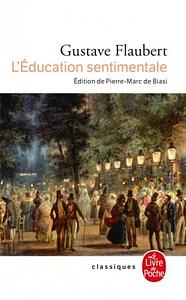You need to sign in or sign up before continuing.
Take a photo of a barcode or cover
I I had read an edition with more comprehensive annotations. There are many, many references to mid 19th century French politics that you have to google in order to have an idea about what you are reading. This edition had very cursory notes, when it had any at all. Very frustrating. There are also many references to magazines, stores, brands, restaurants, clubs etc that I knew had to be telling the reader what a character was like so those had to be looked up as well. Very time consuming. You know, something along the lines of how we would know something about a fictional character if the author said they listened to NPR & drove a Volvo vs listened to Sean Hannity & drove a pick up truck. The author doesn't have to spell it out. By knowing how a character lives, we know more about their values, education, political leanings etc. Flaubert does this in Sentimental Education but since I don't know the minutiae of daily Parisian life back then, I'm sure many references flew right over my head.
Some quotes that stood out to me:
He found that the happiness he deserved by virtue of his sensitive soul was slow in coming.
Senecal wore the gloomy look of a Puritan arriving in the midst of a party.
He wanted to burst out, to do generous deeds. He looked around him to see if there was anyone near whom he could help. No wretch happened to be passing by; and his generosity of spirit evaporated, for he was not a man to go out of his way to find opportunities for benevolence.
He paid deference to him in order to control him.
HIs intelligence was not high enough to attain to art, nor commonplace enough to look to merely profit, so that, without satisfying anyone, he had ruined himself.
Senecal considered only the masses and exhibited an utter absence of pity for individuals.
He imagined he had offended them, not realizing what vast reserves of indifference society possesses.
There are some men whose only mission amongst their fellowmen is to serve as go-betweens; people use them in the same way as if they were bridges, by stepping over them and going on further.
Certain men take delight in making their friends do things which are disagreeable to them.
Deslauriers preferred Frederic in a position of mediocrity. In this way he remained his friend's equal and in a more intimate relationship with him.
Property rose to the level of religion and was indistinguishable from God.
The casual style of dress blurred differences of social position.
Frederic was fascinated and exceedingly amused by the scene around him. The wounded who sank to the ground, the dead lying at his feet, did not seem like people really wounded or dead. The impression left on his mind was that he was watching a show.
The smock was full of spite against the tailcoat.
All the luxuries seemed more precious after the emotion of the past few days. They felt a fresh delight at possessing things which they had been afraid of losing.
They glorified a rural existence on the assumption that the uneducated man had naturally more sense than other men.
Sentimental Education, published in 1869, has officially become my favourite Gustave Flaubert's novel thus dethroning Madame Bovary in my heart which I had never thought possible.
The first aspect that struck me in Flaubert's Sentimental Education is how far it actually is from the literary realism movement that it is supposed to spring from. In fact, I strongly believe that Flaubert's novel lays down the foundations of modernism while certain scenes, especially those revolving around chance, seemed to lean towards surrealism making him a precursor of both literary movements.
In Sentimental Education, much like in his other works, Gustave Flaubert makes fun of romanticism through the use of Frédéric Moreau, the main protagonist, whose lyrical flights are immediately succeeded by doubt, mundanity, ennui and dispiritedness. And yet, Flaubert expresses a certain fondness for the romantic literary movement throughout his novel just as he subtly voices his attachment to Frédéric, an inexperienced young man, who spends most of his time fantasizing his life without ever realizing his ambitions and dreams. In a way, Flaubert celebrates the non-exceptionality of being. And though he gives shape and corporality to his characters, he doesn't gift them with complete materiality.
Another aspect of Flaubert's writing is his distinctive irony though it doesn't constitute the sole strength of Flaubert's style. In fact, the author excels at depicting landscapes; he describes them in such a way that they might as well be the exact replicas of impressionist paintings (the first encounter between Frédéric Moreau and Madame Arnoux is the perfect example of that).
Flaubert's Sentimental Education is a magnificent novel about love, friendship and the disillusionment of life.
Lo principal, aquí encontraremos una historia de desamor con un interesante trasfondo histórico. Nos encontramos en París de mediados del siglo XIX cuando la revolución del pueblo está en el aire y acompañaremos a un joven burgués en sus aventuras románticas. Puede sonar aburrido, pero hay un elenco de personajes muy interesantes, que los amas o los odias. Me encantaron todos por su diversidad y por representar a una sociedad. De las mejores cosas que tiene este libro es que su estilo es increíblemente descriptivo y cuidado, no se deja en el aire el más mínimo detalle y eso le da un gran peso al realismo de la historia.
Reseña completa: http://rapsodia-literaria.blogspot.com/2012/05/la-educacion-sentimental-de-gustave.html


